What the tanking oil price means for inflation and these ASX energy stocks
Oil prices are down 40% from the five-years highs of US$120 a barrel we saw for WTI crude last June. That’s despite rallying slightly to just over $70 this week from the recent nadir of US$65, crude’s lowest point since the pandemic shutdowns of 2020.
We’ve not heard much about this – or what it means for the inflation outlook, drowned out by fears of a banking crisis-led “GFC 2.0” that have dominated the global financial conversation lately.
Brent Crude oil price chart
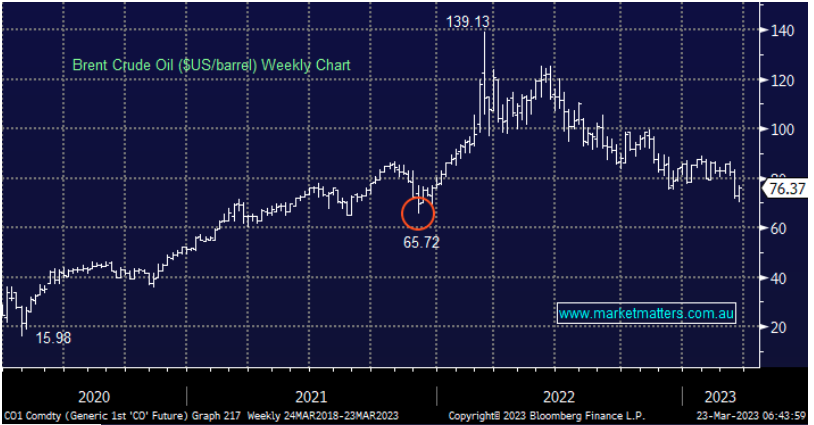
But when crude prices were trending up, US Federal Reserve Chair Jerome Powell in March 2022 said that, as a rule of thumb, every $10 per barrel increase in the price of crude oil raises inflation by 0.2% and sets back economic growth 0.1%.
And in October, US President Joe Biden committed to reducing national crude stockpiles in a bid to reduce fuel prices that have surged since he took office in 2021. Around the same time, the International Monetary Fund emphasised the role of energy prices, and transport costs both directly and indirectly – alongside other costs such as food – in rising inflation. It also highlighted the need for fiscal policy to cushion the consumer impact, costs that governments offset by raising taxes and cutting spending.
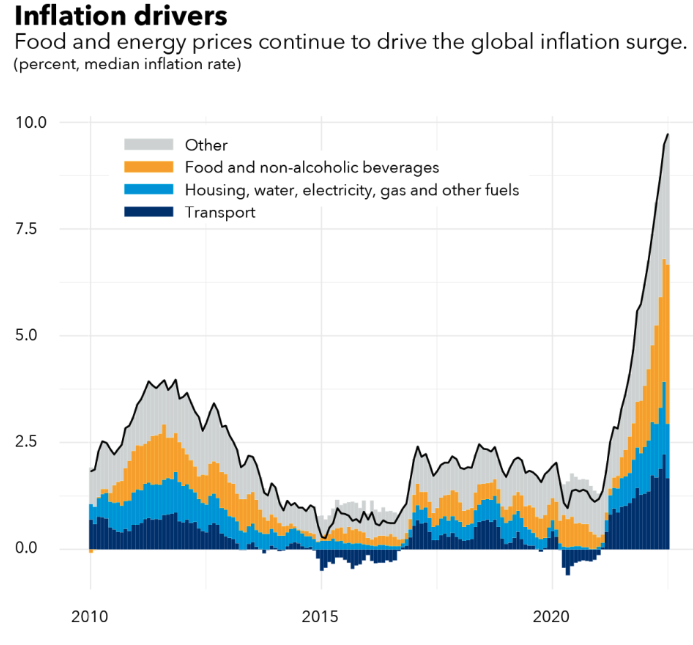
Source: IMF CBI database and IMF staff calculations. Note: The chart shows median total inflation in select categories across 88 countries.
Why hasn’t more been said about falling energy prices?
Energy prices make up a relatively small portion of the gauges the Federal Reserve watches, and their effect on overall inflation is less pronounced than it seems, according to one recent paper from European thinktank, The Centre for Economic Policy Research.
“There is strong evidence that rising energy prices were not the main determinant of the surge in US consumer price inflation,” wrote Lutz Kilian and Xiaoqing Zhou, both of whom work at the Federal Reserve Bank of Dallas.
They note that automotive fuel accounts for about 4% of inflation, considerably less than food or housing: “Spikes in oil prices have historically caused only temporary increases in overall inflation, and the costs of other energy products are also relatively small.”
This is a view shared by Emanuel Datt of Datt Capital.
“In isolation, the oil price probably doesn’t mean a great deal for inflation, with oil an upstream commodity,” he says.
“But given it’s a basis of modern life, the oil price will have a minor effect on inflation in Australia. We’ll probably see that reflected in the price of fuel and the price of energy.”
Datt believes other factors including government intervention ultimately have a bigger influence, pointing to the energy and electricity price caps introduced along Australia’s eastern seaboard.
What does this mean for investors?
Tumbling energy prices based on the market’s “ongoing belief that the global economy is moving toward an inevitable recession combined with China’s fairly muted growth targets for 2023,” were mentioned in a recent note by James Gerrish of Market Matters.
“But we’re conscious that stocks often lead major tops/bottoms in their underlying commodity prices, which in turn generally run six to 12 months ahead of the economy, hence we are starting to look for clues that ‘enough is enough’ on the downside for the energy complex.”
The ASX 200 Energy index is down 8.6% in the year so far, as shown in the chart below.
ASX 200 Energy Index in 2023 so far
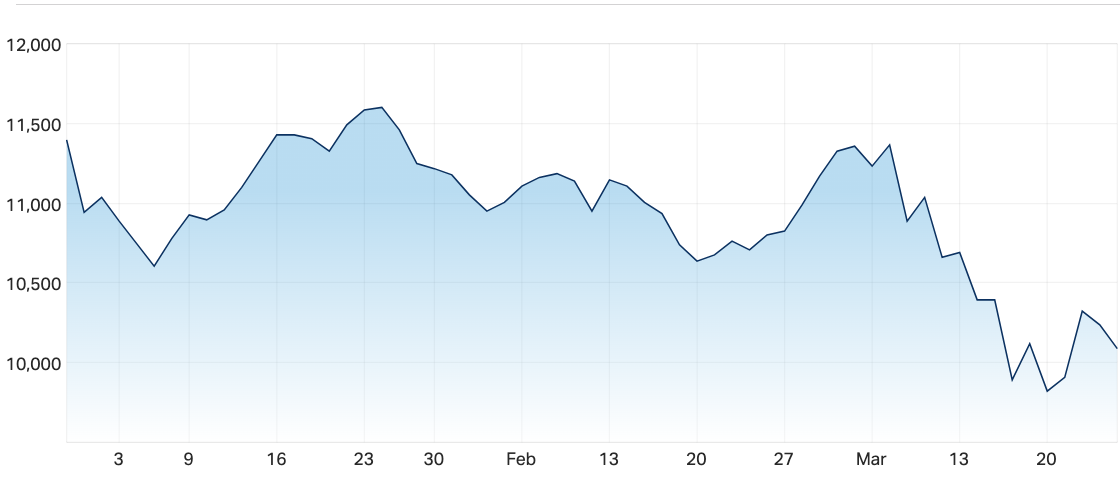
On a broader sector level, Datt believes energy will remain an important theme – also one that can be used by the Russian Government to pressure nations around the world. “But ultimately, that’s more of a short-term catalyst,” he says.
“There are still considerable impediments to the commercialisation of new energy sources. I think that means it will remain a scarce resource," Datt says.
And energy production itself is exposed to cost inflation, for example, the cost of plants, equipment and labour are all direct inputs into energy production.
“Inflation lifts the cost base of these energy projects, which may cause smaller, more marginal producers and projects to close down,” Datt says.
Note: The following companies are not held by Datt Capital.
The information below isn't investment advice. Always speak to a professional before making investment decisions.
Woodside Energy Group (ASX: WDS)
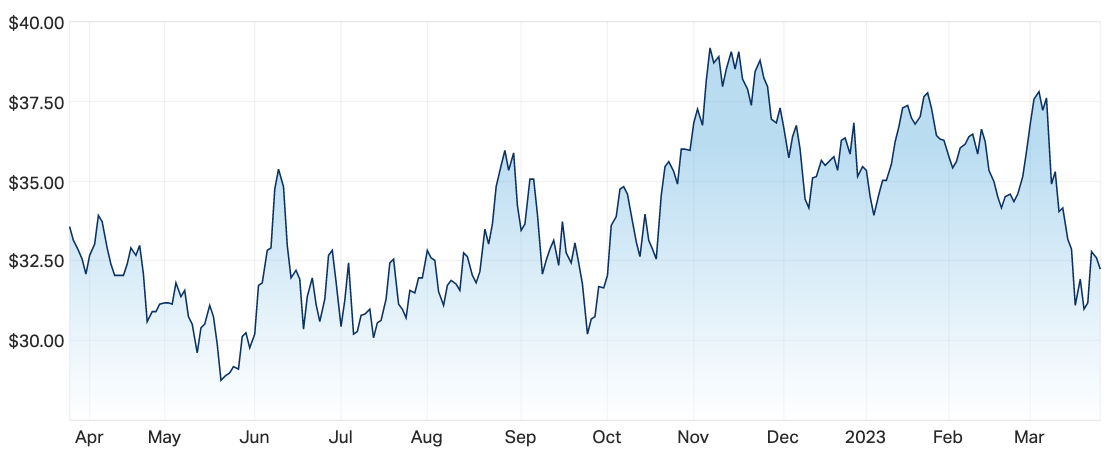
The largest of the 11 companies in the index, Woodside shares have fallen around 10% from the highs of 2022 – though Gerrish emphasises it paid a US$1.44 fully-franked dividend last month.
“Like many in the space, WDS is not expensive trading on a P/E of 9.4x even as it churns mountains of cash hence, we remain buyers into weakness,” Gerrish writes.
The natural gas and oil producer was downgraded by JPMorgan earlier this month to NEUTRAL from Overweight. Analyst Mark Busuttil reduced his price target to $34 from $36.50.
Citi also downgraded Woodside – to NEUTRAL from Buy – in January, its price target cut to $37.55 from $38.50.
Jarden downgraded the company to UNDERWEIGHT from NEUTRAL ON 18 January, analyst Nik Burns reducing the price target to $33 from $33.70.
Santos (ASX: STO)
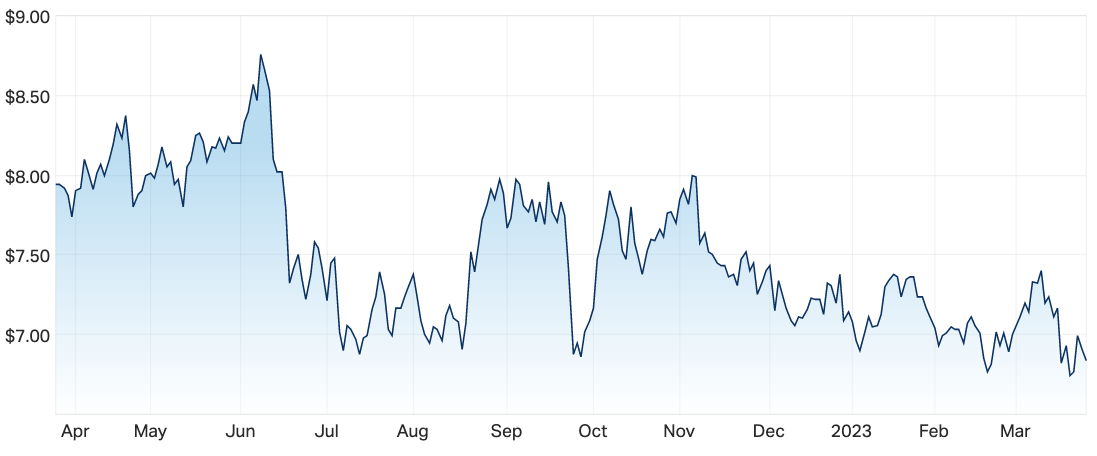
JPMorgan also downgraded the second largest ASX energy company on 9 March, shifting its rating to NEUTRAL from Overweight. Analyst Mark Busuttil also dropped his price target to $8.30 from $8.65.
Market Matters’ Gerrish writes that STO has “struggled to match high-flying Woodside over the last 6-12 months,” due to several stock-specific headwinds following its acquisition of Oil Search.
CLSA downgraded STO to OUTPERFORM from Buy at the end of November, with analyst Daniel Butcher setting a price target of $8.11, down from $8.81.
Goldman Sachs – before upending its local energy sector ratings operation a few months ago – rated Santos as a BUY when adding the company to its coverage list on 12 December, with an $8.94 price target.
Never miss an insight
If you're not an existing Livewire subscriber you can sign up to get free access to investment ideas and strategies from Australia's leading investors.
You can follow my profile to stay up to date with other wires as they're published – don't forget to give them a “like”.
4 topics
2 stocks mentioned
2 contributors mentioned

